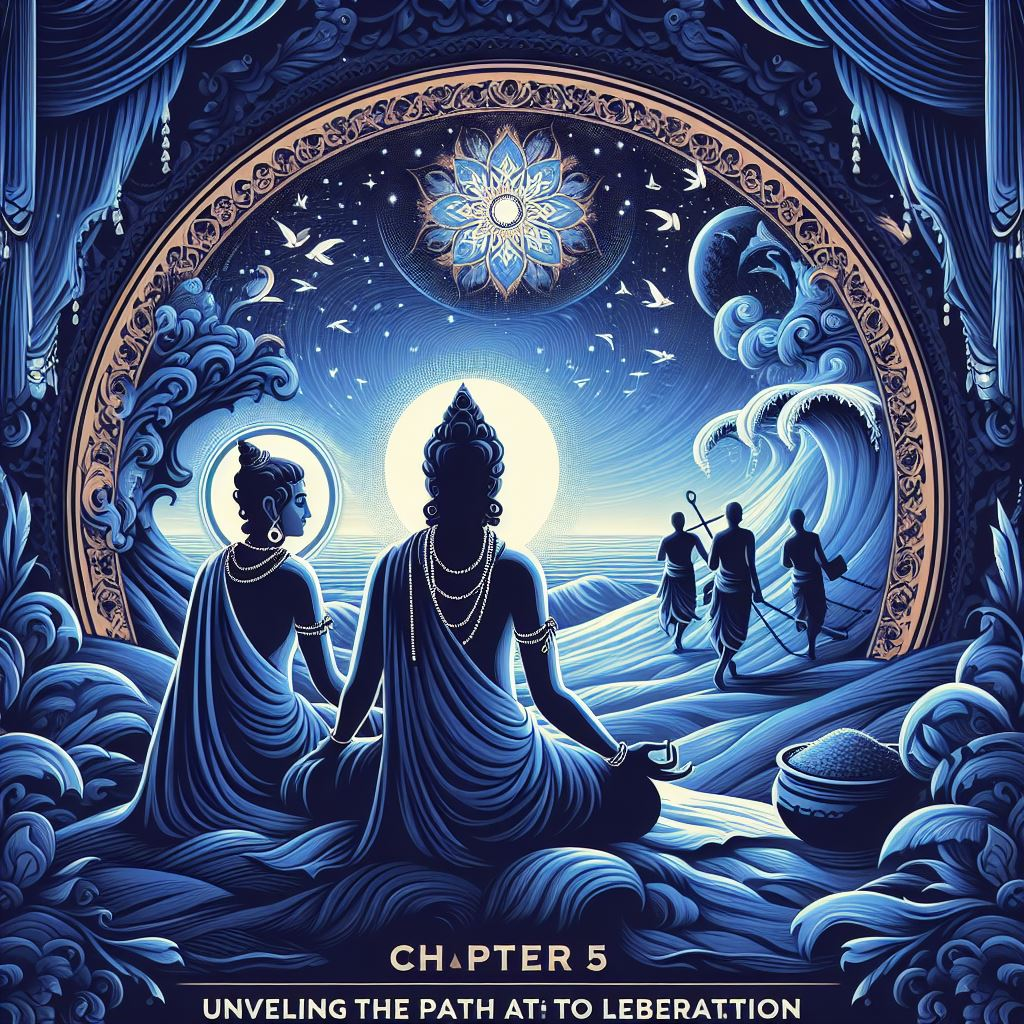The fifth chapter of the Bhagavad Gita is Karma Sanyasa Yoga. In this chapter, Krishna compares the paths of renunciation in actions (Karma Sanyas) and actions with detachment (Karma Yoga) and explains that both are means to reach the same goal and we can choose either. A wise person should perform his/her worldly duties without attachment to the fruits of his/her actions and dedicate them to God. This way they remain unaffected by sin and eventually attain liberation.
slok:’5.1′,
‘arjuna uvāca . saṃnyāsaṃ karmaṇāṃ kṛṣṇa punaryogaṃ ca śaṃsasi . yacchreya etayorekaṃ tanme brūhi suniścitam ||5-1||’,
‘5.1 Arjuna said Renunciation of actions, O Krishna, Thou praisest, and again Yoga. Tell me conclusively that which is the better of the two.’,
slok:’5.2′,
‘śrībhagavānuvāca . saṃnyāsaḥ karmayogaśca niḥśreyasakarāvubhau . tayostu karmasaṃnyāsātkarmayogo viśiṣyate ||5-2||’,
‘5.2 The Blessed Lord said Renunciation and the Yoga of action both lead to the highest bliss; but of the two, the Yoga of action is superior to the renunciation of action.’,
slok:’5.3′,
‘jñeyaḥ sa nityasaṃnyāsī yo na dveṣṭi na kāṅkṣati . nirdvandvo hi mahābāho sukhaṃ bandhātpramucyate ||5-3||’,
‘5.3 He should be known as a perpertual Sannyasi who neither hates nor desires; for, free from the pairs of opposites, O mighty-armed Arjuna, he is easily set free from bondage.’,
slok:’5.4′,
‘sāṅkhyayogau pṛthagbālāḥ pravadanti na paṇḍitāḥ . ekamapyāsthitaḥ samyagubhayorvindate phalam ||5-4||’,
‘5.4 Children, not the wise, speak of knowledge and the Yoga of action or the performance of action as though they are distinct and different; he who is truly established in one obtains the fruits of both.’,
slok:’5.5′,
‘yatsāṅkhyaiḥ prāpyate sthānaṃ tadyogairapi gamyate . ekaṃ sāṅkhyaṃ ca yogaṃ ca yaḥ paśyati sa paśyati ||5-5||’,
‘5.5 That place which is reached by the Sankhyas or the Jnanis is reached by the Yogis (Karma Yogis). He sees, who sees knowledge and the performance of action (Karma Yoga) as one.’,
slok:’5.6′,
‘saṃnyāsastu mahābāho duḥkhamāptumayogataḥ . yogayukto munirbrahma nacireṇādhigacchati ||5-6||’,
‘5.6 But renunciation, O mighty-armed Arjuna, is hard to attain without Yoga; the Yoga-harmonised sage ickly goes to Brahman.’,
slok:’5.7′,
‘yogayukto viśuddhātmā vijitātmā jitendriyaḥ . sarvabhūtātmabhūtātmā kurvannapi na lipyate ||5-7||’,
‘5.7 He who is devoted to the path of action, whose mind is ite pure, who has conered the self, who has subdued his senses and who realises his Self as the Self in all beings, though acting, is not tainted.’,
slok:’5.8′,
‘naiva kiñcitkaromīti yukto manyeta tattvavit . paśyañśruṇvanspṛśañjighrannaśnangacchansvapañśvasan ||5-8||’,
‘5.8 “I do nothing at all,” thus would the harmonised knower of Truth think seeing, hearing, touching, smelling, eating, going, sleeping, breathing.’,
slok:’5.9′,
‘pralapanvisṛjangṛhṇannunmiṣannimiṣannapi . indriyāṇīndriyārtheṣu vartanta iti dhārayan ||5-9||’,
‘5.9 Speaking, letting go, seizing, opening and closing the eyes convinced that the senses move among the sense-objects.’,
slok:’5.10′,
‘brahmaṇyādhāya karmāṇi saṅgaṃ tyaktvā karoti yaḥ . lipyate na sa pāpena padmapatramivāmbhasā ||5-10||’,
‘5.10 He who does actions, offering them to Brahman, and abandoning attachment, is not tainted by sin, just as a lotus-leaf is not tainted by water.’,
slok:’5.11′,
‘kāyena manasā buddhyā kevalairindriyairapi . yoginaḥ karma kurvanti saṅgaṃ tyaktvātmaśuddhaye ||5-11||’,
‘5.11 Yogis, having abandoned attachment, perform actions only by the body, mind, intellect, and even by the senses, for the purification of the self.’,
slok:’5.12′,
‘yuktaḥ karmaphalaṃ tyaktvā śāntimāpnoti naiṣṭhikīm . ayuktaḥ kāmakāreṇa phale sakto nibadhyate ||5-12||’,
‘5.12 The united one (the well poised or the harmonised) having abandoned the fruit of action attains to the eternal peace: the non-united only (the unsteady or the unbalanced) impelled by desire, attached to the fruit, is bound.’,
slok:’5.13′,
‘sarvakarmāṇi manasā saṃnyasyāste sukhaṃ vaśī . navadvāre pure dehī naiva kurvanna kārayan ||5-13||’,
‘5.13 Mentally renouncing all actions and self-controlled, the embodied one rests happily in the nine-gated city, neither acting nor causing others (body and senses) to act.’,
slok:’5.14′,
‘na kartṛtvaṃ na karmāṇi lokasya sṛjati prabhuḥ . na karmaphalasaṃyogaṃ svabhāvastu pravartate ||5-14||’,
‘5.14 Neither agency nor actions does the Lord create for the world, nor union with the fruits of actions. But it is Nature that acts.’,
slok:’5.15′,
‘nādatte kasyacitpāpaṃ na caiva sukṛtaṃ vibhuḥ . ajñānenāvṛtaṃ jñānaṃ tena muhyanti jantavaḥ ||5-15||’,
‘5.15 The Lord takes neither the demerit nor even the merit of any; knowledge is enveloped by ignorance, thery beings are deluded.’,
slok:’5.16′,
‘jñānena tu tadajñānaṃ yeṣāṃ nāśitamātmanaḥ . teṣāmādityavajjñānaṃ prakāśayati tatparam ||5-16||’,
‘5.16 But to those whose ignorance is destroyed by the knowledge of the Self, like the sun, knowledge reveals the Supreme (Brahman).’,
slok:’5.17′,
‘tadbuddhayastadātmānastanniṣṭhāstatparāyaṇāḥ . gacchantyapunarāvṛttiṃ jñānanirdhūtakalmaṣāḥ ||5-17||’,
‘5.17 Their intellect absorbed in That, their self being That, established in That, with That for their supreme goal, they go whence there is no return, their sins dispelled by knowledge.’,
slok:’5.18′,
‘vidyāvinayasampanne brāhmaṇe gavi hastini . śuni caiva śvapāke ca paṇḍitāḥ samadarśinaḥ ||5-18||’,
‘5.18 Sages look with an eal eye on a Brahmana endowed with learning and humility, on a cow, on an elephant, and even on a dog and an outcaste.’,
slok:’5.19′,
‘ihaiva tairjitaḥ sargo yeṣāṃ sāmye sthitaṃ manaḥ . nirdoṣaṃ hi samaṃ brahma tasmād brahmaṇi te sthitāḥ ||5-19||’,
‘5.19 Even here (in this world) birth (everything) is overcome by those whose minds rest in eality; Brahman is spotless indeed and eal; therefore they are established in Brahman.’,
slok:’5.20′,
‘na prahṛṣyetpriyaṃ prāpya nodvijetprāpya cāpriyam . sthirabuddhirasammūḍho brahmavid brahmaṇi sthitaḥ ||5-20||’,
‘5.20 Resting in Brahman, with steady intellect and undeluded, the knower of Brahman neither rejoiceth on obtaining what is pleasant nor grieveth on obtaining what is unpleasant.’,
slok:’5.21′,
‘bāhyasparśeṣvasaktātmā vindatyātmani yatsukham . sa brahmayogayuktātmā sukhamakṣayamaśnute ||5-21||’,
‘5.21 With the self unattached to external contacts he finds happiness in the Self; with the self engaged in the meditation of Brahman he attains to the endless happiness.’,
slok:’5.22′,
‘ye hi saṃsparśajā bhogā duḥkhayonaya eva te . ādyantavantaḥ kaunteya na teṣu ramate budhaḥ ||5-22||’,
‘5.22 The enjoyments that are born of contacts are only generators of pain, for they have a beginning and an end, O Arjuna; the wise man does not rejoice in them.’,
slok:’5.23′,
‘śaknotīhaiva yaḥ soḍhuṃ prākśarīravimokṣaṇāt . kāmakrodhodbhavaṃ vegaṃ sa yuktaḥ sa sukhī naraḥ ||5-23||’,
‘5.23 He who is able, while still here (in this world) to withstand, before the liberation from the body, the impulse born out of desire and anger he is a Yogi, he is a happy man.’,
slok:’5.24′,
‘yo.antaḥsukho.antarārāmastathāntarjyotireva yaḥ . sa yogī brahmanirvāṇaṃ brahmabhūto.adhigacchati ||5-24||’,
‘5.24 He who is happy within, who rejoices within, and who is illuminated within, that Yogi attains absolute freedom or Moksha, himself becoming Brahman.’,
slok:’5.25′,
‘labhante brahmanirvāṇamṛṣayaḥ kṣīṇakalmaṣāḥ . chinnadvaidhā yatātmānaḥ sarvabhūtahite ratāḥ ||5-25||’,
‘5.25 The sages (Rishis) obtain absolute freedom or Moksha they whose sins have been destroyed, whose dualities (perception of dualities or experience of the pairs of opposites) are torn asunder, who are self-controlled, and intent on the welfare of all beings.’,
slok:’5.26′,
‘kāmakrodhaviyuktānāṃ yatīnāṃ yatacetasām . abhito brahmanirvāṇaṃ vartate viditātmanām ||5-26||’,
‘5.26 Absolute freedom (or Brahmic bliss) exists on all sides for those self-controlled ascetics who are free from desire and anger, who have controlled their thoughts and who have realised the Self.’,
slok:’5.27′,
‘sparśānkṛtvā bahirbāhyāṃścakṣuścaivāntare bhruvoḥ . prāṇāpānau samau kṛtvā nāsābhyantaracāriṇau ||5-27||’,
‘5.27 Shutting out (all) external contacts and fixing the gaze between the eyrow, ealising the outgoing and incoming breaths moving within the nostrils.’,
slok:’5.28′,
‘yatendriyamanobuddhirmunirmokṣaparāyaṇaḥ . vigatecchābhayakrodho yaḥ sadā mukta eva saḥ ||5-28||’,
‘5.28 With the senses, the mind and the intellect (ever) controlled, having liberation as his supreme goal, free from desire, fear and anger the sage is verily liberated for ever.’,
slok:’5.29′,
‘bhoktāraṃ yajñatapasāṃ sarvalokamaheśvaram . suhṛdaṃ sarvabhūtānāṃ jñātvā māṃ śāntimṛcchati ||5-29||’,
‘5.29 He who knows Me as the enjoyer of sacrifices and austerities, the great Lord of all the worlds and the friend of all beings, attains to peace.’,
slok:’5.30′,
‘OM tatsaditi śrīmadbhagavadgītāsūpaniṣatsu brahmavidyāyāṃ yogaśāstre śrīkṛṣṇārjunasaṃvāde saṃnyāsayogo nāma pañcamo.adhyāyaḥ ||5-30||’,
‘Swami Sivananda did not comment on this sloka’,

